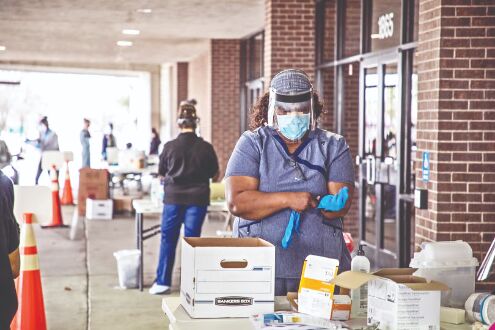US CDC classifies Delta variant as 'variant of concern'

Washington DC: As cases tumble and states reopen, the potential final stage in the US campaign to vanquish COVID-19 is turning into a slog, with a worrisome variant gaining a bigger foothold and lotteries and other prizes failing to persuade some Americans to get vaccinated.
The last half, the last mile, the last quarter-mile always requires more effort, Dr. Nirav Shah, director of the Maine Center for Disease Control and Prevention, said Wednesday.
While two of the states slammed hardest by the disaster, California and New York, celebrated their reopenings this week with fireworks and a multimillion-dollar drawing, hospitalisations in parts of Missouri are surging and cases are rising sharply in Texas, illustrating the challenges the country faces this summer.
One major concern is the highly contagious and potentially more severe Delta variant of the Coronavirus that originated in India.
While health officials say the vaccines are effective against it, the fear is that it will lead to outbreaks in states with lower vaccination rates.
The Delta variant has increased from 2.7 per cent of all cases in May to 9.7 per cent this month, Dr Rochelle Walensky, director of the US Centers for Disease Control and Prevention, said during a call for governors on Monday, according to details provided by the Washington governor's office.
At the same time, states are convening focus groups to better understand who is declining to get vaccinated, why, and how to convince them that getting the shot is the right thing to do.
It's a race between the vaccines going into people and the current or future variants, said Kansas Health Secretary Dr. Lee Norman.
Average deaths and cases per day have plummeted 90 per cent or more across the US since the winter. But the picture is uneven.
In Texas, the rolling average of newly confirmed infections has climbed from about 1,000 per day on May 31 to nearly 2,000 this week.
A swath of Missouri is seeing a big rise in cases and hospitalisations as tourists eager to get out after being cooped up for a year make their way to popular destinations like Branson and Lake of the Ozarks.
Health officials said more than 200 people were hospitalised with the virus in southwestern Missouri, nearly double the number at the start of May.
The number of patients in intensive care units in the region has tripled.
Health experts cite two factors driving the surge there: the faster-spreading Delta variant and a reluctance among residents to get vaccinated.
The US is expected to fall short of President Joe Biden's goal of dispensing at least one dose to 70 per cent of American adults by July 4. The figure stands at about 65 per cent.
Elsewhere around the world, there have been glimmers of hope, as India reopened the Taj Mahal amid a decline in new infections. In France, where virus cases are below 4,000 per day down from 35,000 in the spring authorities eased the requirements on wearing masks outdoors and said the nightly curfew will end this weekend.
We have not known such a low level of virus spreading since last August, Prime Minister Jean Castex said.
Meanwhile, South Africa imposed tighter restrictions on public gatherings and liquor sales as hospital admissions due to COVID-19 increased by 59 per cent over the past two weeks, authorities said. New cases there have nearly doubled.
The recorded US death toll from COVID-19 hit 600,000 on Tuesday, according to a tally by Johns Hopkins University.
Worldwide, it stands at 3.8 million, though both numbers are thought to be a significant undercount.
Meanwhile, the US Centers for Disease Control and Prevention has classified the Delta, a highly transmissible COVID-19 variant first identified in India, as a "variant of concern."
"The B.1.1.7 (Alpha), B.1.351 (Beta), P.1 (Gamma), B.1.427 (Epsilon), B.1.429 (Epsilon), and B.1.617.2 (Delta) variants circulating in the United States are classified as variants of concern. To date, no variants of high consequence have been identified in the United States," the CDC said in a statement on Tuesday.
The CDC said the Delta variant shows increased transmissibility, potential reduction in neutralisation by some monoclonal antibody treatments under emergency authorisation and potential reduction in neutralization from sera after vaccination in lab tests. The variant of concern designation is given to strains of the virus that scientists believe are more transmissible or can cause more severe disease.



